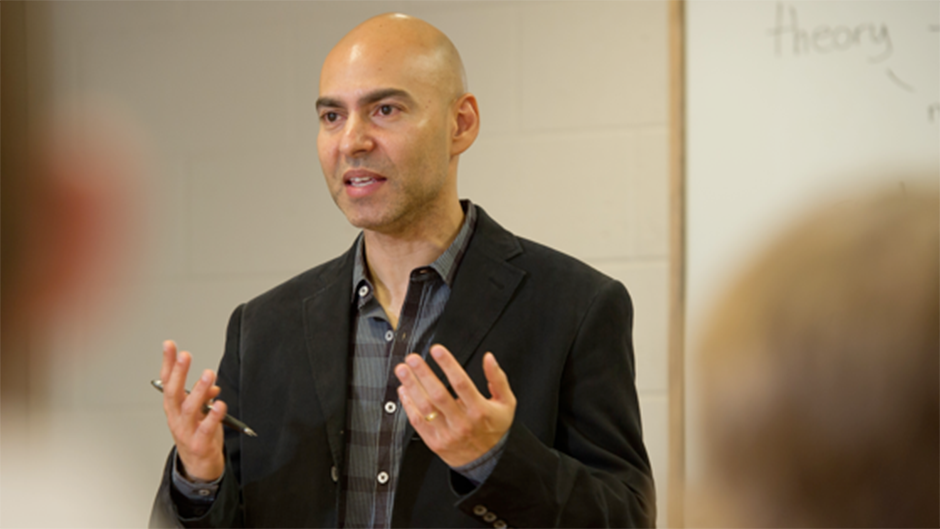
The question of God’s existence is not new – German philosopher Friedrich Nietzsche first said “God is dead” in 1882. But the University of Miami made national headlines by tapping Anjan Chakravartty as the first atheism, humanism and secular ethics chair. This is the first chair of its kind in the nation.
Chakravartty will begin his tenure on July 1. He currently serves as a philosophy professor and director of the John J. Reilly Center for science, technology and values at the University of Notre Dame.
“Well, you have to admit that the optics of it are kind of funny on the surface,” Chakravartty said. “Coming from a renowned Catholic university into a chair that has ‘atheism, humanism and secular ethics’ in the title.”
He said he enjoys the apparent irony as much as the next person, but he said he has always had the freedom to pursue intellectual and philosophical questions he found important, without any pressure to approach them from a particular background or perspective, so the change in position isn’t a big leap in that sense.
The chair was announced as part of UM President Julio Frenk’s “100 talents for 100 years” roadmap initiative: to bring 100 new endowed chair positions to UM by the university’s centennial in 2025.
“We want University of Miami to be a magnet for talent,” Frenk said at a roundtable with The Miami Hurricane in August 2016, shortly after the announcement of the initiative. “Endowments are what make great universities great … Because they are in perpetuity, they offer a level of stability that is essential.”
The endowment for this particular chair was created by a $2.2 million donation in May 2016 from Louis Appignani. Appignani is an 84-year-old retired Miami businessman and philanthropist whose foundation focuses on free thought and humanist values. He purportedly had a serious conversion to atheism in college.
Chakravartty’s primary consideration during the application, search and subsequent decision process was what the conception of the chair was in the eyes of the university. He wanted to make sure that his skill set and research interests would align with the vision for the chair.
The search committee’s emphasis on approaching big questions from an interdisciplinary perspective helped convince him to take on the position, he said.
“The issues that are suggested by the title of the chair are really deep and important,” Chakravartty said. “They’re existential issues for a lot of people. And I find that when it comes to thinking about questions like that, it’s a mistake to believe that you can adopt a very narrow perspective, say from the confines of any very specific discipline, and succeed in thinking about those questions in an appropriately thorough way.”
Fred Frohock, professor of political science and author of numerous books on the subjects of political philosophy, religion and ethics, served on the search committee to fill the chair position. Frohock said he wanted to be part of the selection process and is glad he did.
“I have a feeling that this guy we brought in understands that sometimes a linear approach doesn’t get the job done,” Frohock said. “I wanted someone who’s ready to look into the awkward parts of things and be prepared to take on overlaps and hostilities between some of the extremes in religion and some of the extremes in atheism.”
But despite having “atheism” in his job description, Chakravartty said he will not take a public stance on where his personal views lie.
“In our role as professors, we’re really educators and not lobbyists,” Chakravartty said. “If I were to announce what my view is, some people might mistakenly think that I’m going to be advocating or lobbying for that view, when in fact I want all arguments on all sides to be put on the table and for us to discuss them critically.”
A May 2016 Gallup poll found 11 percent of Americans do not believe in God, and an additional 10 percent were “not sure” about their beliefs. University of Miami collects data about the religious identification of students but published results in the UM Fact Book do not include atheism.
While atheism is on the rise nationally, Chakravartty’s job is not about promoting any particular ideology.
“Nobody’s trying to convert anybody,” Frohock said. “It’s a true intellectual endeavor. And he will be true to that because he is a natural intellectual. He has no desire to bring about a legion of atheists following in his footsteps.“
And while Chakravartty said he wants to go beyond what’s commonly taught about the questions humans have asked since antiquity, Frohock said he believes studying these kind of existential questions remains an uphill battle.
“I don’t know that we have the intellectual or emotive capacities to understand the scope and complexities of the universe,” Frohock said. “We really are poor creatures for that.”






